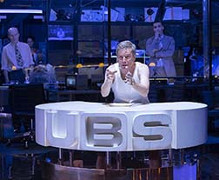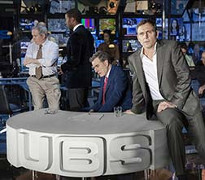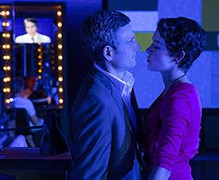
Lucy Komisar
|
“Network,” a stunning commentary on corrupt American system Adapted by Lee Hall from film by Paddy Chayefsky;
directed by Ivo van Hove. It’s astonishing how the politics of Network and the reason for its success has not changed since the Paddy Chayevsky film was screened in 1976. Nearly fifty years, and the story is still based on the reality that a corrupt upper class screws the middle class and the poor to take for itself the wealth everyone else produces and give others the dregs and the shaft. While the “media” glorifies neoliberalism, theatrical “fiction” is the only mainstream place such ideas are permitted.
It starts with Howard Beale (the brilliant Bryan Cranston) announcing he is going to blowhis brain out on air, because he is being fired for poor ratings. It’s lead news all over the country. A hundred reporters in the lobby. Forget Iran; this upcoming blood and gore is upfront and personal. Director Ivo van Hove’s production is terrific, with the stage set up as a TV studio, cameras moving around in a unique, immersive multimedia spectacle. In a mirror, we see a terrorist ??? declaring how technology is being used as an instrument of social control. The rich are becoming richer, the majority impoverished. Economic segregation along racial lines. Ecology of the planet imperiled by the rapacity of a few. Americans lied to by politicians. Repression to enable the capitalist model is bankrupting the economy. Check, check, check and check. It resonates with viewers as a pretty good take on reality.
And then the TV camera goes to a massacre in Detroit. Not so good for the people who run network. Max Schumacher (Tony Goldwyn) the show’s boss doesn’t want it. A bit too far over the edge. But the viewers want edge. Producer Diana Christensen (a driven Tatiana Maslany) says the American people want something to articulate their rage. They will get it with Howard Beale. So many people tune in to hear the details, that it makes the network a lot of money. And the more horrific, the more money. Yet, nobody is organizing to bring the corrupt system down. (There is a bit of irony in people paying $189 for orchestra seats at the Belasco Theatre to hear the fervent TV anchor rail against their class.) So, is Howard fired? After all, Phil Donahue was fired by NBC after he criticized the invasion of Iraq. Did you think US TV operated as a free press?
It turns out that the audience meter trumps all. People love this. They love his rants! He declares, “I’m a human being, my life has value…” Instead of knocking him out, his outrage makes him a star. Big time! Imagine a network making money out of telling the truth: CIA operations, racial inequality, unemployment, a capitalism model that doesn’t work. Beale is articulating the popular rage, inveighing against the hypocrisy of the times. That includes private equity buying America’s patrimony for the Saudis. Dollars washed through Switzerland. Everything is for sale. He gets people to open their windows and shout, “I’m mad as hell and I’m not going to take it anymore.” But Beale doesn’t know the power of the system he has bought into. It’s a lot more powerful than he is. Or than unorganized shouts into the street. The network’s corporate chief Jensen (Nick Wyman) says, “There is no America, no democracy. There is only IBM, ITT, Ford, GE, Exon. Those are the nations of the world….What exists is the endless primordial movement of money…The world is a business, Mr. Beale.”
And Diana, declares, “No one wants to hear about the dying of democracy.” Who will prevail in the conflict of citizens vs corporations? The #MeToo moment is turned on its head by Diana rather joylessly seducing Max practically in the laps of patrons who paid extra to sit in an on-stage café. But Van Hove is known for his erotic misogyny, last in his horrific theatrical adaptation of Ayn Rand’s “The Fountainhead,” so I was not surprised. In the end the play is a take-down, maybe truer than the hoped for popular revolt, the leader sucked into the lure of corporate media. Given the fakery of current news media, and the people who sell the souls they maybe once had for fame and money, the story is truer and sadder than Chayefsky might have imagined. Should Beale get his just deserts for his attack on the system? Lee and Van Hove append a not-in-the-original neoliberal ending in which Beale talks about “the destructive power of absolute beliefs” and says “the only total commitment any of us can have is to other people.” Sounds like what some preachers told slaves and their progeny. In other words, don’t act against the oppression you suffer, enjoy your friends and family. Hall and Van Hove have taken a radical film and at the end turned it reactionary. Visit Lucy’s website http://thekomisarscoop.com/
|
| museums | NYTW mail | recordings | coupons | publications | classified |




